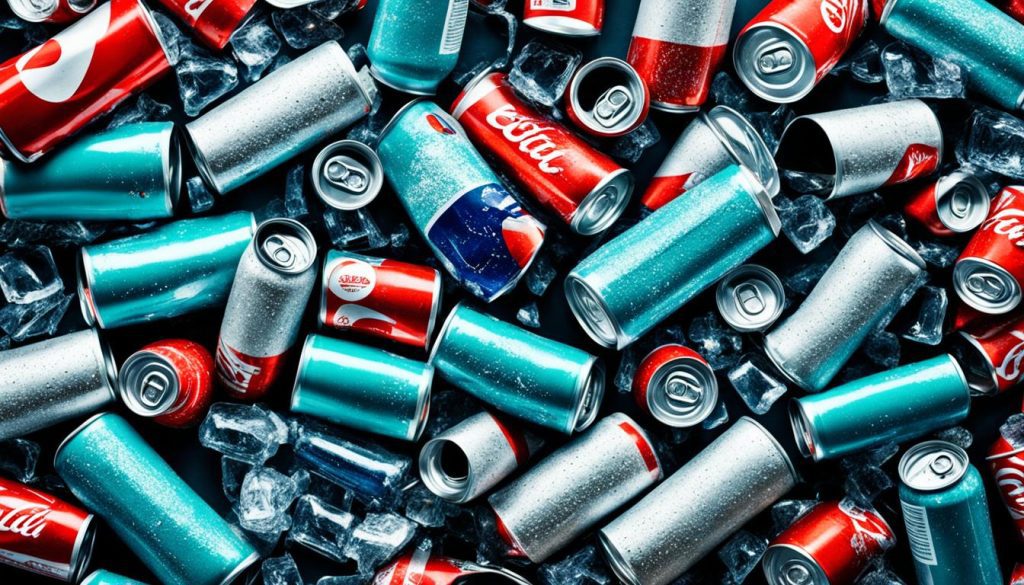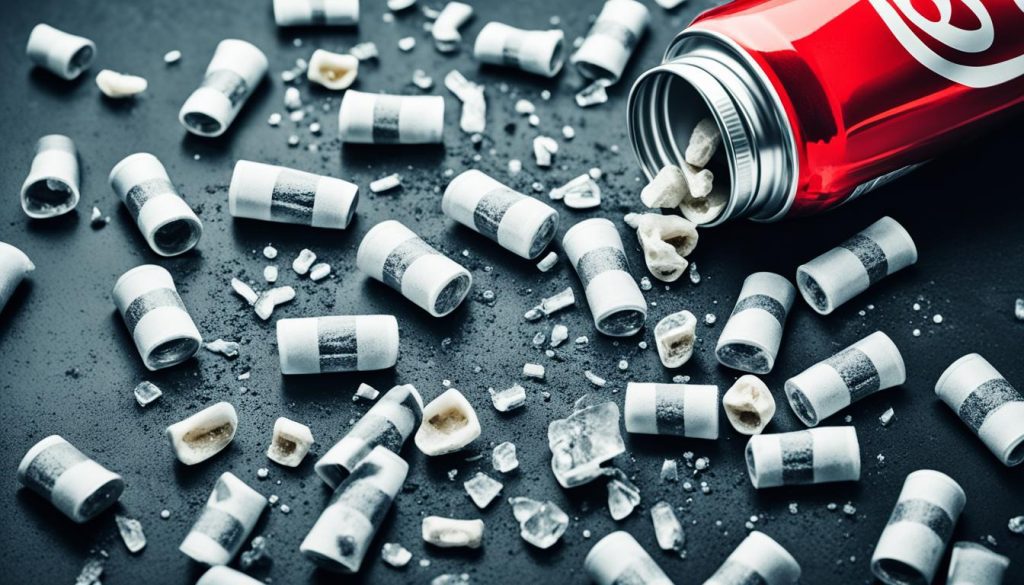Hello, today I want to discuss an important topic that has become a matter of concern for many: the potential health risks associated with soda consumption and its impact on bone health. There has been a growing body of evidence linking soda to detrimental effects on our bones, and it’s crucial that we understand the facts to make informed decisions about our health.
Soda Destroys Bones – The Truth
- Soda consumption has been linked to an increased risk of fractures and lower bone mineral density.
- Phosphoric acid and caffeine, common ingredients in soda, may contribute to bone loss and interfere with calcium absorption.
- Regular intake of cola-based sodas has been associated with lower bone mineral density in women.
- High soda consumption, especially of cola-based sodas, is linked to a decline in bone density.
- Phosphoric acid in soda can lead to an imbalance in mineral homeostasis and increased bone mineral loss.
The Link Between Soda and Osteoporosis
Research has shown that soda consumption and osteoporosis, a condition characterized by weak and brittle bones, are linked. Studies have found that women who regularly drink cola-based sodas have lower bone mineral density, even when accounting for calcium and vitamin D intake. This suggests that other factors in soda may be contributing to bone loss.
Two potential culprits are phosphoric acid and caffeine. Phosphoric acid, commonly found in most sodas, has been associated with reduced bone density. Additionally, caffeine, present in both caffeinated and non-caffeinated sodas, has been found to interfere with calcium absorption, thus potentially compromising bone health.
Unfortunately, more research is needed to fully understand the relationship between soda consumption and osteoporosis. However, the existing evidence does suggest a connection between soda and bone health concerns.
While we await further scientific exploration, it is important to be mindful of the amount of soda we consume. Cutting back on soda and making healthier beverage choices, such as water, herbal tea, or milk (which promotes bone health with its calcium content), can be beneficial for maintaining strong and healthy bones.
By making informed choices about our beverage consumption, we can take proactive steps toward preserving our bone health and reducing the potential risks associated with excessive soda consumption.
Soda’s Impact on Bone Density
Research studies have consistently shown that consuming high amounts of soda, particularly cola-based sodas, can have harmful effects on bone density. It has been found that women who regularly consume three or more cola-based sodas per day have a nearly 4% lower bone mineral density in the hip compared to those who consume fewer or no sodas.
This decline in bone density could be attributed to the presence of phosphoric acid and caffeine in these sodas. Phosphoric acid, commonly found in soda, has been linked to bone damage and mineral loss due to its interference with calcium balance and absorption. Caffeine, another commonly found ingredient in soda, has also been associated with decreased calcium absorption and can contribute to weakened bones.

In order to maintain strong and healthy bones, it is important to be aware of the detrimental effects that excessive soda consumption can have on bone density. By reducing soda intake and opting for healthier beverage choices, individuals can help mitigate the negative impact on skeletal health. Additionally, incorporating foods and beverages rich in calcium into the diet can support optimal bone health and counteract the harmful effects of soda.
Phosphoric Acid and Bone Loss
Phosphoric acid, a common ingredient in soda, has been linked to bone loss. While phosphorus is essential for bone health, excessive consumption of phosphoric acid, combined with low calcium intake, can disrupt mineral balance and contribute to bone mineral loss. Ongoing research is examining the exact mechanisms through which phosphoric acid affects bone health.
Soda’s role in weakening bones goes beyond just its high sugar content. Phosphoric acid, found in many carbonated drinks, has been shown to have detrimental effects on bone health.
When phosphoric acid is consumed in excess, it can disrupt the delicate balance of minerals in the body, leading to increased bone mineral loss. Low levels of calcium, combined with high levels of phosphorus from phosphoric acid, can further exacerbate this imbalance and contribute to bone degeneration.
While the exact mechanisms underlying the association between phosphoric acid and bone loss are still being studied, it is clear that excessive soda consumption can have negative effects on bone mineral density and overall bone health.
Caffeine and Calcium Absorption
Another factor that contributes to the detrimental effects of soda on bone strength is caffeine. Caffeine is present in both caffeinated and non-caffeinated sodas and has been shown to interfere with calcium absorption.
Calcium is a crucial mineral for building and maintaining strong bones. However, when caffeine is consumed, it can hinder the body’s ability to absorb calcium efficiently. This can ultimately lead to reduced bone mineral density and an increased risk of fractures.
While researchers are still studying the exact impact of caffeine on bone health, it is advisable to limit soda consumption, especially for individuals who are at risk of osteoporosis or have low calcium intake. By reducing soda intake and opting for healthier alternatives, such as water or calcium-rich beverages, individuals can enhance their skeletal health.
- Limit soda intake to decrease the negative impact on bone health
- Choose healthier beverage options like water or calcium-rich drinks
- Ensure an adequate intake of calcium through foods and supplements
- Consider consulting with a healthcare professional for personalized recommendations
The Role of Nutrient Displacement
One possible explanation for the negative impact of soda on bone health is nutrient displacement. High soda intake may lead to a lower intake of other important beverages, such as milk, which is rich in calcium. When individuals consume large amounts of soda, they may be replacing nutritious liquids with sugary and carbonated drinks, leading to inadequate intake of essential nutrients for bone health.
Soda consumption can have a detrimental effect on bone health. When individuals regularly consume large quantities of soda, they may be neglecting other beverages that are vital for maintaining strong bones. For example, milk is rich in calcium, a crucial nutrient for bone health. By replacing milk with soda, individuals are depriving their bodies of essential nutrients needed to support bone density and overall skeletal health.
Inadequate calcium intake can lead to reduced bone mineral density and an increased risk of bone fractures. Calcium is essential for maintaining strong and healthy bones throughout life. However, when soda displaces calcium-rich beverages like milk, the body may not receive sufficient amounts of this vital nutrient. As a result, bone health can be compromised, and the risk of bone-related issues, such as osteoporosis, may increase.
- High soda intake can lead to a lower intake of calcium-rich beverages, such as milk.
- Replacing nutritious drinks with sugary and carbonated sodas can result in inadequate intake of essential nutrients for bone health.
- Inadequate calcium intake from soda consumption can contribute to decreased bone mineral density and an increased risk of fractures.
The Importance of Balanced Nutrition
It is crucial to maintain a balanced diet that includes sufficient amounts of calcium to support bone health. While it may be challenging to completely eliminate soda from one’s diet, reducing its consumption can help minimize the negative impact on bone health. By prioritizing calcium-rich beverages like milk and incorporating other calcium-rich foods such as leafy greens, yogurt, and cheese, individuals can enhance their overall bone density and reduce the risk of bone-related issues.
It is essential to be mindful of the beverages we consume and the effect they have on our bone health. Making informed choices and prioritizing nutrient-rich options can help maintain strong and healthy bones throughout life.
Mitigating the Effects of Soda on Bone Health
While completely eliminating soda from my diet is ideal for bone health, I understand that it may not be practical for everyone. However, there are steps I can take to reduce my soda intake and compensate with healthier alternatives to help mitigate the negative effects on my bone health.
- Substituting soda with non-cola options: Instead of reaching for a can of soda, I can opt for healthier alternatives such as flavored water, herbal tea, or natural fruit juices. These options can still provide a refreshing taste without the harmful effects of soda on my bones.
- Increasing calcium intake through milk or fortified beverages: Calcium is essential for maintaining strong and healthy bones. To counteract the soda-related bone deterioration, I can incorporate calcium-rich drinks like milk, fortified plant-based milk, or calcium-fortified orange juice into my diet. These beverages can help support optimal bone health and mitigate the risks associated with soda consumption.
- Incorporating calcium-rich foods into my diet: In addition to consuming calcium-rich beverages, I can also focus on incorporating foods that are high in calcium. Some examples of calcium-rich foods include dairy products like yogurt and cheese, leafy green vegetables such as kale and broccoli, and fortified cereals. By diversifying my diet and consuming a variety of calcium-rich foods, I can further support my bone health.
To visualize the negative impact of soda on bone health, refer to the image below:

The image depicts the dangers of drinking soda for bones, highlighting the soda-related bone deterioration and the increased risk of osteoporosis associated with excessive soda consumption.
Conclusion
Based on the studies and research discussed, it is evident that high soda consumption can have a negative impact on bone health. The evidence suggests that excessive soda intake is associated with lower bone mineral density and an increased risk of fractures. While the exact mechanisms behind this link are still being explored, it is important to take steps to protect our skeletal system.
To maintain optimal bone health, it is advisable to limit soda consumption and focus on following a balanced diet that includes adequate amounts of calcium. Making healthier beverage choices, such as opting for water or milk instead of soda, can significantly reduce the detrimental effects on bone health. Additionally, incorporating calcium-rich foods, like dairy products, leafy greens, and fortified cereals, can help support strong and healthy bones.
While more research is needed to fully understand the impact of soda on the skeletal system, taking proactive measures to reduce soda intake and prioritize nutrient-rich alternatives can go a long way in safeguarding our bone health. By making informed choices, we can take control of our lifestyle habits and promote the wellbeing of our bones for a healthier future.
FAQ
Is soda consumption linked to negative effects on bone health?
Yes, there is evidence linking soda consumption to negative effects on bone health. High soda intake is associated with a higher risk of fractures and lower bone mineral density.
What are the potential reasons for the link between soda and bone health?
The exact reasons for the link are still unclear, but it may be due to soda displacing healthier drinks in the diet, leading to lower intake of essential nutrients for bone health such as calcium. Phosphoric acid and caffeine, common ingredients in soda, have also been suggested to contribute to bone loss and interfere with calcium absorption.
Does soda consumption increase the risk of osteoporosis?
Yes, numerous studies have found a connection between soda consumption and osteoporosis, a condition characterized by weak and brittle bones. Women who regularly drink cola-based sodas have been found to have lower bone mineral density, even after controlling for calcium and vitamin D intake.
Does soda intake affect bone density?
Yes, high soda intake, especially of cola-based sodas, is associated with a decline in bone density. Women who consume three or more cola-based sodas per day have been found to have almost 4% lower bone mineral density in the hip.
What are the effects of phosphoric acid in soda on bone health?
Phosphoric acid, a common ingredient in soda, has been implicated in bone loss. Excessive intake of phosphoric acid, combined with low calcium intake, can lead to an imbalance in mineral homeostasis and increased bone mineral loss.
Does caffeine in soda affect calcium absorption and bone health?
Yes, caffeine, found in both caffeinated and non-caffeinated sodas, has been shown to interfere with calcium absorption. Lower calcium absorption can result in reduced bone mineral density and increased risk of fractures.
Can soda intake displace other essential nutrients for bone health?
Yes, high soda intake may lead to a lower intake of other important beverages, such as milk, which is rich in calcium. When individuals consume large amounts of soda, they may be replacing nutritious liquids with sugary and carbonated drinks, leading to inadequate intake of essential nutrients for bone health.
How can I mitigate the negative effects of soda on bone health?
While eliminating soda from your diet is ideal, reducing soda intake, substituting sodas with non-cola options, increasing calcium intake through milk or fortified beverages, and incorporating calcium-rich foods into your diet can help support optimal bone health.
What should I consider about soda and bone health?
Studies indicate a potential link between high soda consumption and negative effects on bone health, such as lower bone mineral density and increased risk of fractures. Limiting soda intake and consuming a balanced diet that includes adequate amounts of calcium is advisable for optimal bone health.




